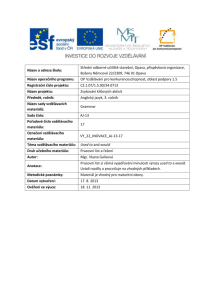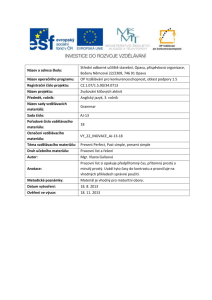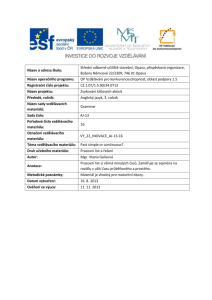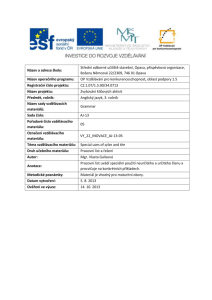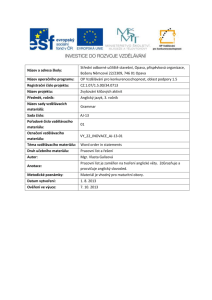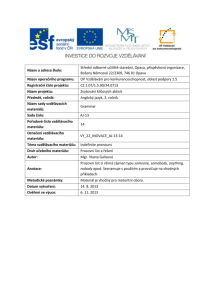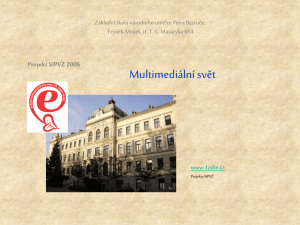reported speech - Integrovaná střední škola technická Vysoké Mýto
advertisement
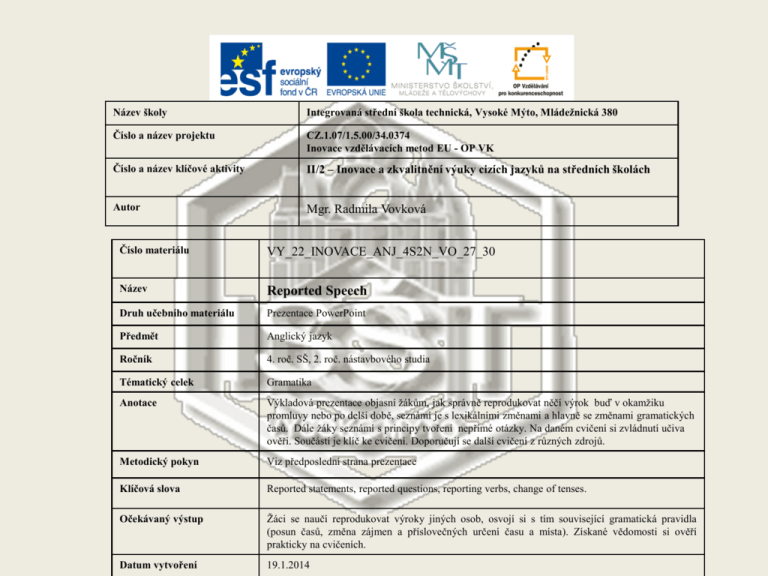
Název školy Integrovaná střední škola technická, Vysoké Mýto, Mládežnická 380 Číslo a název projektu CZ.1.07/1.5.00/34.0374 Inovace vzdělávacích metod EU - OP VK Číslo a název klíčové aktivity II/2 – Inovace a zkvalitnění výuky cizích jazyků na středních školách Autor Mgr. Radmila Vovková Číslo materiálu VY_22_INOVACE_ANJ_4S2N_VO_27_30 Název Reported Speech Druh učebního materiálu Prezentace PowerPoint Předmět Anglický jazyk Ročník 4. roč. SŠ, 2. roč. nástavbového studia Tématický celek Gramatika Anotace Výkladová prezentace objasní žákům, jak správně reprodukovat něčí výrok buď v okamžiku promluvy nebo po delší době, seznámí je s lexikálními změnami a hlavně se změnami gramatických časů. Dále žáky seznámí s principy tvoření nepřímé otázky. Na daném cvičení si zvládnutí učiva ověří. Součástí je klíč ke cvičení. Doporučují se další cvičení z různých zdrojů. Metodický pokyn Viz předposlední strana prezentace Klíčová slova Reported statements, reported questions, reporting verbs, change of tenses. Očekávaný výstup Žáci se naučí reprodukovat výroky jiných osob, osvojí si s tím související gramatická pravidla (posun časů, změna zájmen a příslovečných určení času a místa). Získané vědomosti si ověří prakticky na cvičeních. Datum vytvoření 19.1.2014 REPORTED STATEMENTS They announed they would come on Tuesday. She told us she had lived in Australia. • Direct speech – exact words and „ …..“ John said: „I haven´t eaten since the morning.“ • When we report speech with a reporting verb say, tell, ask, answer, reply, announce, report, write, read, want to know, know, learn, feel, add in the present we use the same tenses but we have to change the pronouns and verb forms John says (that) he hasn´t eaten since the morning.. • When we report somebody´s speech after some time, we use past tense of the verbs and the tense of the verbs is changed, too. John said he hadn´t eaten since the morning. Direct Speech Present Simple „We work every day.“ Present Continuous „I am doing my homework“. Past Simple „I spent two years in Mexico.“ Past Continuous „They were travelling around Europe.“ Present Perfect Simple „I haven´t packed my luggage yet.“ Reported Speech Past Simple They said they worked every day. Past Continuous He said he was doing his HW. Past Perfect He said he had spent 2 years in Mexico. Past Perfect Continuous They said they had been travelling around Europe. Past Perfect Simple She said she hadn´t packed her luggage yet. Direct Speech Reported Speech Present Perfect Continuous Past Perfect Continuous „We have been waiting for you They said they had been 2 hours.“ waiting for me/us 2 hours. Be going to Was/Were going to „We are going to get married in They announced they were June.“ going to get married in June. Modal verbs (can, will, must) „I can´t walk any more.“ „The results will be known soon.“ „You must stop crying.“ Could, Would, Had to She added she couldn´t walk any more. They reported the results would be known soon. Mum said to her daughter she had to/must stop crying. Other Changes in Reported Speech Words for Time and Place Direct Speech Reported Speech today tonight tomorrow that day that night the next day/the following day next (week, month etc.) the next/the following (week, month, …) ago yesterday last (week, month, …) before now here this (place) the day before/the previous day the last/the previous (week, month,…) then there that (place) Other Changes in Reported Speech Pronouns and Possessives Direct Speech I me my mine you your Reported Speech he/she him/her his/her his/hers I/we my/our Direct Speech yours we us our ours Reported Speech mine/ours they them their theirs Note! We don´t change the tense when: • Situations/feelings/opinions in the original speech are still true: „I love your brother.“ - She said she loves my brother. • We talk about generally valid truth: „2+2 are four.“ - We learnt that 2+2 are four. • MUST expresses permanent necessity: „You must not smoke!“ – The doctor ordered (me) that I must not smoke. • Past Perfect is used in original speech. „I hadn´t flown before.“ – She said she hadn´t flown before. Reported Questions „Are you busy?“ • She wants to know if you are busy. • She wanted to know if you were busy. „Where does Sue live?“ • We want to know where Sue lives. • We wanted to know where Sue lived. The same rules as for reported statements. However, the word order is the same as in declarative sentences (oznamovací věty). And now a bit of practice. You met Kevin yesterday, he told you many new things. Report them. 1. „I´m living in London.“ Kevin told me he was living in London. 2. „My father isn´t very well.“ He said his father wasn´t very well. 3. „My sister has had a baby. He said his sister had had a baby. 4. „I saw Helen at a party in June and she seemed fine.“ He said he had seen Helen at a party in June and she had seemed fine. he saw Helen at a party in June and she seemed fine. 5. „I don´t know what Frank is doing.“ Kevin said he didn´t know what Frank was doing. 6. „I haven´t seen Joe recently.“ He said he hadn´t seen Joe recently. 7. „I´ll tell Chris I saw you“. He said he would tell Chris he had seen me. 8. „I want to go on holiday but I can´t afford it.“ Kevin told me he wanted to go on holiday but he couldn´t afford it. PRACTISE MORE IN YOUR BOOKS Metodické pokyny k materiálu 1)Tento digitální učební materiál je zaměřen na osvojení si učiva týkajícího se nepřímé/reprodukované řeči včetně otázek. 2) Na prvních stranách se žáci seznámí s pravidly pro vyjadřování nepřímé řeči v okamžiku promluvy a s odstupem času, s lexikálními změnami v oblasti zájmen, příslovečných určení místa a času a se změnami gramatických časů. 3)Další část materiálu je zaměřena na pravidla tvoření nepřímé otázky 4) Předposlední část přináší výjimky v reprodukované řeči. 5) Poslední část je zaměřena na základní procvičení daného materiálu. Doporučuje se vypracovat podobná cvičení z jiných zdrojů. 6) Metodický pokyn je uveden u cvičení. Použité zdroje FOLEY, Mark; HALL, Diane. My Grammar Lab: Intermediate. Harlow: Pearson, 2013, ISBN 9781408299159. MURPHY, Raymond. English Grammar in Use. Intermediate. Cambridge: Cambridge University Press, 2004, ISBN 0 52153289 2. AUTOR NEUVEDEN. klipart [online]. [cit. 19.1.2014]. Dostupný na WWW: http://office.microsoft.com
